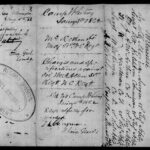In an earlier post, “Feuding in the Officers’ Ranks,” I described the squabbling among the Fifty-First’s officers that left the regiment with only one field officer for almost four months. In this three-part series I add further details gleaned from documents contained in the NARA compiled service records of some of the officers involved during this chaotic period of the regiment’s history.
Cantwell Resigns
On October 19, 1862, Colonel John L. Cantwell, commanding the 51st North Carolina, unexpectedly resigned. Immediately after Cantwell submitted his resignation, he hurried home to Wilmington to address “circumstances of an imperative personal character.”
Colonel Cantwell’s sudden departure left Lieutenant Colonel William Allen in command of the regiment. Major Hector McKeithan was second-in-command. The Fifty-First was conducting picket operations in the Kinston area at the time. No attempt was made to promote Allen and McKethan while the regiment was in the field.
Allen’s Outburst
The 51st North Carolina finally returned to Wilmington on the 17th of November. A week later, the Fifty-First was assigned to a new brigade under the command of Brigadier General Thomas L. Clingman. General Clingman quickly convened an examining board for officer promotions. Lt. Col. Allen sat for the board on December 12.
Before the board could recommend any promotions, the Fifty-First rushed to Goldsboro. A Yankee expedition, marching from New Bern, was threatening the strategic railroad junction at Goldsboro. The regiment arrived in the town on the afternoon of December 16. The next day, a sharp engagement occurred. The Yankees burned the railroad bridge across the Neuse and withdrew toward their base.
The 51st North Carolina left Goldsboro, on foot, on December 27. On the third day of the march, Lt. Colonel Allen subjected Major McKethan to a drunken tongue-lashing. McKethan did not take kindly to Allen’s abuse, and shortly after the regiment returned to Wilmington, he preferred charges against the lieutenant colonel.
Charges and Specifications
Camp Whiting. Jan 4/1863
Charges and Specifications against William A. Allen, Lt Col Comdg 51st Regt N.C.T.
Charge 1st Violation of 45th Article of War: Lt. Col. William A. Allen did, on the night of December 30, 1852, come into camp intoxicated and brought intoxicating liquors with him.
Charge 2nd Violation of 83rd Article of War: Lt. Col. Allen verbally abused Major Hector McKethan, calling him “a damned son of a bitch.”
Charge 3rd Violation of the 25th Article of War: Lt. Col. Allen challenged Major McKethan to a duel and threatened to shoot McKethan or anyone who preferred charges against him.
Charge 4th Violation of 28th Article of War: Lt. Col. Allen accused Major McKethan of cowardice for refusing to fight a duel, even though McKethan made every attempt to appease Allen.
Witnesses: Dr. S. B. Morissey, Surgeon; Capt. D. W. Ketchum, Commissary; Lt. J. A. McArthur, Co I; Lt. W. Hartman, Co F; Sgt. W. McKenzie, Co D; A. T. Robeson, Hospital Steward
Allen Resigns
Hearing of the charges and specifications against him, Lieutenant Colonel Allen submitted his letter of resignation the next day:
“I have the honor through you respectfully to tender my resignation as Lieutenant Colonel of the 51st Regiment of North Carolina Toops. I am induced to do so at this time for the following reasons. 1st Because of resenting an imputation against my character offered by Maj. H. McKethan. I am informed that upon his representation of the matter the Commanding General advised him to prefer charges against me, which though unfounded in fact are sufficiently unpleasant to induce me to seek to sever my connection with the command. 2nd Being afflicted with Rheumatism I feel unfitted for an active Winter Campaign. This resignation is unconditional and immediate.”
General Clingman endorsed Allen’s letter, remarking “the acceptance of the resignation would contribute to the good of the service.” General Whiting added “approved decidedly.” On January 19, 1863, Assistant Secretary of War John A. Campbell accepted Allen’s resignation.
Aftermath
William Allen returned to Kenansville and resumed his law practice. He was later appointed major, commanding the 7th Battalion of Home Guards.
Within a few weeks, Hector McKethan was promoted to colonel, commanding the 51st North Carolina. Politicking for the other two field officer positions (lieutenant colonel and major) began immediately. It would take several weeks to select the new officers, and they were not formally promoted until April.
45th Article of War
Any commissioned officer who shall be found drunk on his guard, party, or other duty, shall be cashiered.
83rd Article of War
Any commissioned officer convicted before a general court-martial of conduct unbecoming an officer and a gentleman, shall be dismissed [from] the service.
25th Article of War
No officer or soldier shall send a challenge to another officer or soldier, to fight a duel or accept a challenge if sent, upon pain, if a commissioned officer, of being cashiered.
28th Article of War
Any officer or soldier who shall upbraid another for refusing a challenge, shall himself be punished as a challenger.
Copyright © 2021 – 2024 by Kirk Ward. All rights reserved.
